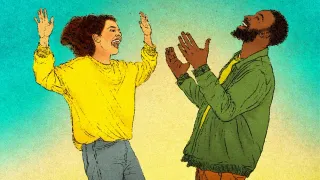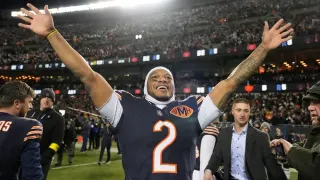
3 hours ago
What to Stream: 'Stranger Things,' Jennifer Lawrence, 'Ne Zha Ii' and Kate Winslet
The Associated Press READ TIME: 4 MIN.
Jennifer Lawrence playing a new mother whose behavior becomes increasingly erratic in “Die My Love" and three more “Stranger Things” episodes are some of the new television, films, music and games headed to a device near you.
Also among the streaming offerings worth your time this week, as selected by The Associated Press’ entertainment journalists: Disney Parks Magical Christmas Day Parade featuring Gwen Stefani and Nicole Scherzinger, the Chinese animated epic “Ne Zha II" and Simu Liu starring as an intelligence analyst whose brain has been hacked in Peacock’s “The Copenhagen Test.”
New movies to stream from Dec. 22-28
— Jennifer Lawrence plays a new mother whose behavior becomes increasingly erratic in Lynne Ramsay’s “Die My Love,” streaming on Mubi on Dec. 23. Robert Pattinson plays her husband in this story adapted from Ariana Harwicz’s novel. In his review for The Associated Press, Film Writer Jake Coyle wrote called it “a jagged, go-for-broke psychodrama” raging with a “primal punk spirit.” He added, “there’s plenty to admire in Ramsay’s uncompromising and delirious portrait of marital hell, particularly in the bracingly raw performance of Lawrence.”
— The Chinese animated epic “Ne Zha II,” which is the highest grossing animated movie of all time with over $2.2 billion in ticket sales, is coming to HBO Max on Wednesday. The film tells the story of a rebellious little child, Ne Zha, born as the reincarnation of a demon to mortal parents, who is out to prove his fate is not predetermined. Michelle Yeoh lent her voice to the English language dub, which she said “immerses you into our culture.” The first film is available to stream on Netflix, but it’s possible to just dive right into the sequel.
— If you like holiday movies with a side of tears, “Goodbye June,” streaming on Netflix on Christmas Eve, might just be the ticket. Kate Winslet directs and stars in this family drama about four adult children (Winslet, Andrea Riseborough, Johnny Flynn, Toni Collette) coming to terms with the fact that their mother, June (Helen Mirren), is dying. In my review, I wrote that it was an admirably solid, if generic, drama that’s elevated by a distinguished cast and moments of humor, grace and insight.
— Speaking of holiday viewing, it’s also worth noting that Prime Video is getting two of the year’s biggest movies: “A Minecraft Movie,” on Monday, and “Sinners,” on Friday, Dec. 26.
New music to stream from Dec. 22-28
— It’s wholesome holiday fun for the whole family! Kicking off at 10 a.m. ET on ABC and streaming at 11 a.m. ET on Disney+, Hulu and the Disney YouTube channel on Christmas Day, music fans can tune into the annual Disney Parks Magical Christmas Day Parade. It’s not just for the kids: The special will feature musical performances from Gwen Stefani,Coco Jones, Iam Tongi, Lady A, Nicole Scherzinger, Mariah the Scientist and Bebe Rexha.
— AP Music Writer Maria Sherman
New series to stream from Dec. 22-28
— Make your Christmas stranger. The next block of installments of ” Stranger Things” — that's episodes 5-7 — drop like a present as the fifth and final season continues. When we last checked out Hawkins, Vecna was deep into a dastardly plan, Demogorgons were menacing and Will Byers was coming into his own powers. The very last episodes will stream on New Year’s Eve.
— Simu Liu stars as an intelligence analyst whose brain has been hacked in Peacock’s new espionage thriller, “The Copenhagen Test.” In addition to Liu, the series' regulars include Melissa Barrera, Sinclair Daniel, Brian d’Arcy James, Mark O’Brien and Kathleen Chalfant. All episodes debut on Dec. 27.
— “Members Only: Palm Beach” is a new Netflix reality show that follows the exclusive, high-end social scene of one of Florida’s most affluent areas, as experienced by five women who are part of the community. “There’s a lot more beneath the sunshine than anyone expects, because nobody goes lower than high society,” Taja Abitbol, one of the stars, explains. It premieres on Dec. 29.
— AP Entertainment Writer Mark Kennedy
New video games to play from Dec. 22-28
— You may be getting — or giving — a new gaming device for Christmas. If so, you should look beyond heavily promoted AAA games and download some of the gems that independent studios released in 2025. Some made The Associated Press’ top 10 list; don’t miss Clair Obscur: Expedition 33, The Séance of Blake Manor and The Alters. The indie sequels Hades II and Hollow Knight: Silksong more than lived up to fans’ expectations. Mystery lovers should test their wits against Blue Prince and The Roottrees are Dead. And if you want a heartfelt story about an Ecuadoran kid dreaming about soccer’s World Cup (who doesn't?), check out Despelote.






